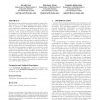Free Online Productivity Tools
i2Speak
i2Symbol
i2OCR
iTex2Img
iWeb2Print
iWeb2Shot
i2Type
iPdf2Split
iPdf2Merge
i2Bopomofo
i2Arabic
i2Style
i2Image
i2PDF
iLatex2Rtf
Sci2ools
106
click to vote
ATAL
2003
Springer
2003
Springer
Towards a pareto-optimal solution in general-sum games
Multiagent learning literature has investigated iterated twoplayer games to develop mechanisms that allow agents to learn to converge on Nash Equilibrium strategy profiles. Such equilibrium configuration implies that there is no motivation for one player to change its strategy if the other does not. Often, in general sum games, a higher payoff can be obtained by both players if one chooses not to respond optimally to the other player. By developing mutual trust, agents can avoid iterated best responses that will lead to a lesser payoff Nash Equilibrium. In this paper we work with agents who select actions based on expected utility calculations that incorporates the observed frequencies of the actions of the opponent(s). We augment this stochasticallygreedy agents with an interesting action revelation strategy that involves strategic revealing of one’s action to avoid worst-case, pessimistic moves. We argue that in certain situations, such apparently risky revealing can indeed pr...
| Added | 06 Jul 2010 |
| Updated | 06 Jul 2010 |
| Type | Conference |
| Year | 2003 |
| Where | ATAL |
| Authors | Sandip Sen, Stéphane Airiau, Rajatish Mukherjee |
Comments (0)

